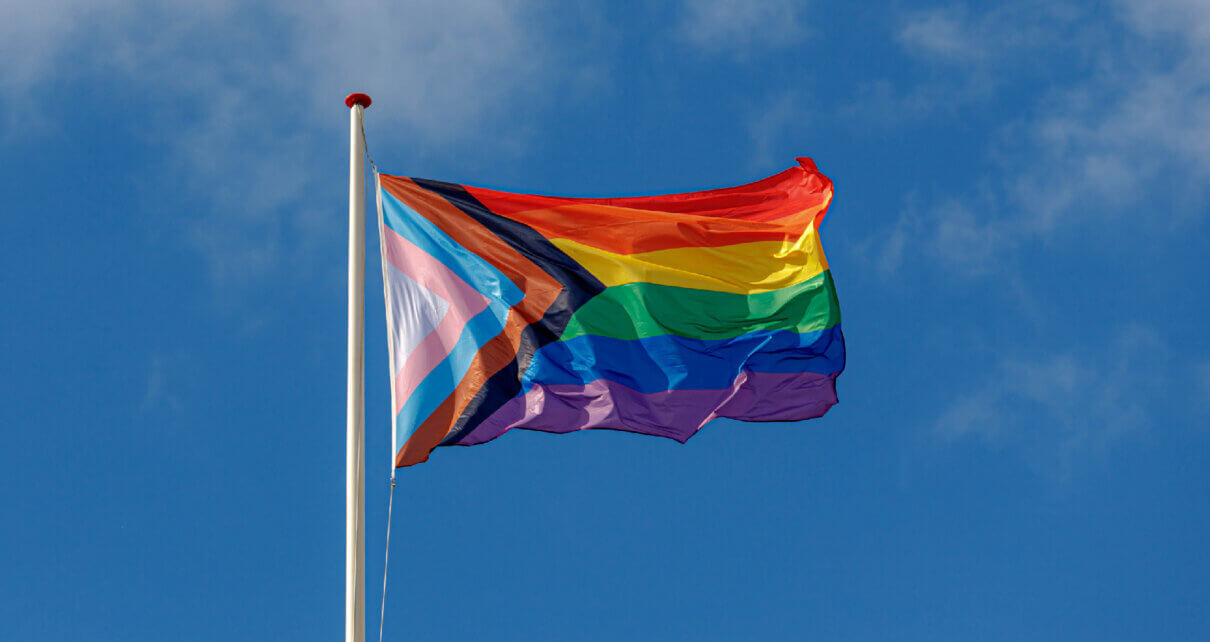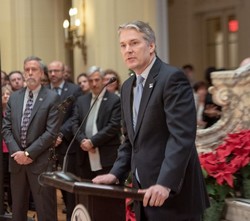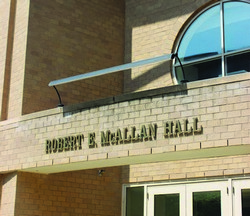Monmouth University President Patrick Leahy announced important updates regarding the implementation of the University’s Chosen Name Initiative in an email sent to the campus community on Thursday, Sept. 22.
The initiative, which Leahy described as “part of our ongoing efforts to foster a welcoming and inclusive campus community,” allows students to update their chosen name information and indicate their preferred pronouns and gender identity through an e-form. Such changes will be reflected across on-campus records within University communications systems including class rosters, eCampus resources, and housing rosters. The utilization of legal names will still be required in some areas, including financial aid and student payroll.
“The Initiative recognizes that in the course of their daily life at Monmouth, some individuals use first names other than their legal names, may want to indicate their pronouns proactively, and/or may have a gender identity/expression that differs from the markers on their legal identification,” he continued.
Although students were able to update this information prior to the advancement of the Chosen Name Initiative, it is now a more convenient option that can be easily accessed through the myMU portal.
Prior to this initiative, students had to contact the Office of Equity and Diversity directly to notify them of changes to preferred names or pronouns. The e-form allows students to initiate the updates directly through the University’s system.
“Students could change their names in Monmouth University records for multiple years prior to this announcement. One of the things I spoke to my colleagues there about was how to make that process a little bit less cumbersome for students,” added Zaneta Rago-Craft, Ed.D., Director of the Intercultural Center and Advisor to the President on Diversity and Inclusion. “It was really a matter of asking questions and doing some outreach to pull different office entities across campus together so that we could be in conversation about how to make the system better for students.”
Chosen name systems and inclusivity training for faculty and staff are becoming more common in colleges and universities across the US. One of the first institutions to implement a formal preferred name and pronoun policy was the University of Vermont, which introduced an updated student information system in 2009 that allowed students to indicate their chosen names and preferred pronouns if desired.
As of June 2022, Campus Pride indicated that at least 788 colleges across the US allow students to use a chosen first name rather than their legal name on campus records and documents. Additionally, the organization found that at least 242 colleges allow students to indicate their preferred pronouns on class rosters.
“I think it was just a good practice for us to introduce to the Monmouth community as well,” explained Rago-Craft.
“It is important for everyone to be able to be addressed by the name and pronoun that they feel most comfortable with. It is about respecting everyone as an individual,” added Anderson.
“I think it’s important for colleges to use chosen names and preferred pronouns because it establishes respect for the queer community and allows people to feel better with their own identities,” said senior chemistry student Julian Rebelo. “Personally, I’ve noticed that professors adhere to students’ preferences on a case by case basis. I’ve seen it more on Zoom calls, but in my STEM classes, I haven’t seen it enacted in a defined manner. Hopefully this newly refined process will allow students to establish these boundaries on their own terms, which might help professors who aren’t fully comfortable asking, especially for in-person classes.”
“We have educational, social, and a lot of collaborative efforts among other departments on campus to signify inclusivity and togetherness. We want everyone to know that they are welcomed and accepted here at Monmouth. We work and collaborate with a lot of the student clubs and groups, so it’s not just us coming up with things that we think are important,” said Jihad Johnson, Program Coordinator for the Intercultural Center.
Rago-Craft noted that the inclusion of pronouns on class rosters was the result of students expressing uncertainty about their ability to share their preferred pronouns in classroom settings. “Giving everyone, not just trans and non-binary students, the opportunity to indicate their pronouns is one way to normalize the fact that we shouldn’t be assuming people’s genders and we should wait for folks to tell us their pronouns before we use our perceptions to apply some for them,” she explained.
“We’re always open to meet with our colleagues and with students to think through what folks would like to see and what folks need on campus. We’d like to see more people reaching out to think through what is most critical to the communities that they serve, or perhaps don’t serve yet, and how to build environments that will serve our campus community as it shifts and grows,” continued Rago-Craft.
“There are many initiatives and offerings that are offered in an effort to make the university a welcoming and inclusive community including gender inclusive housing and gender neutral restrooms on campus. There is always room for improvement and suggestions are welcome,” said Anderson.




